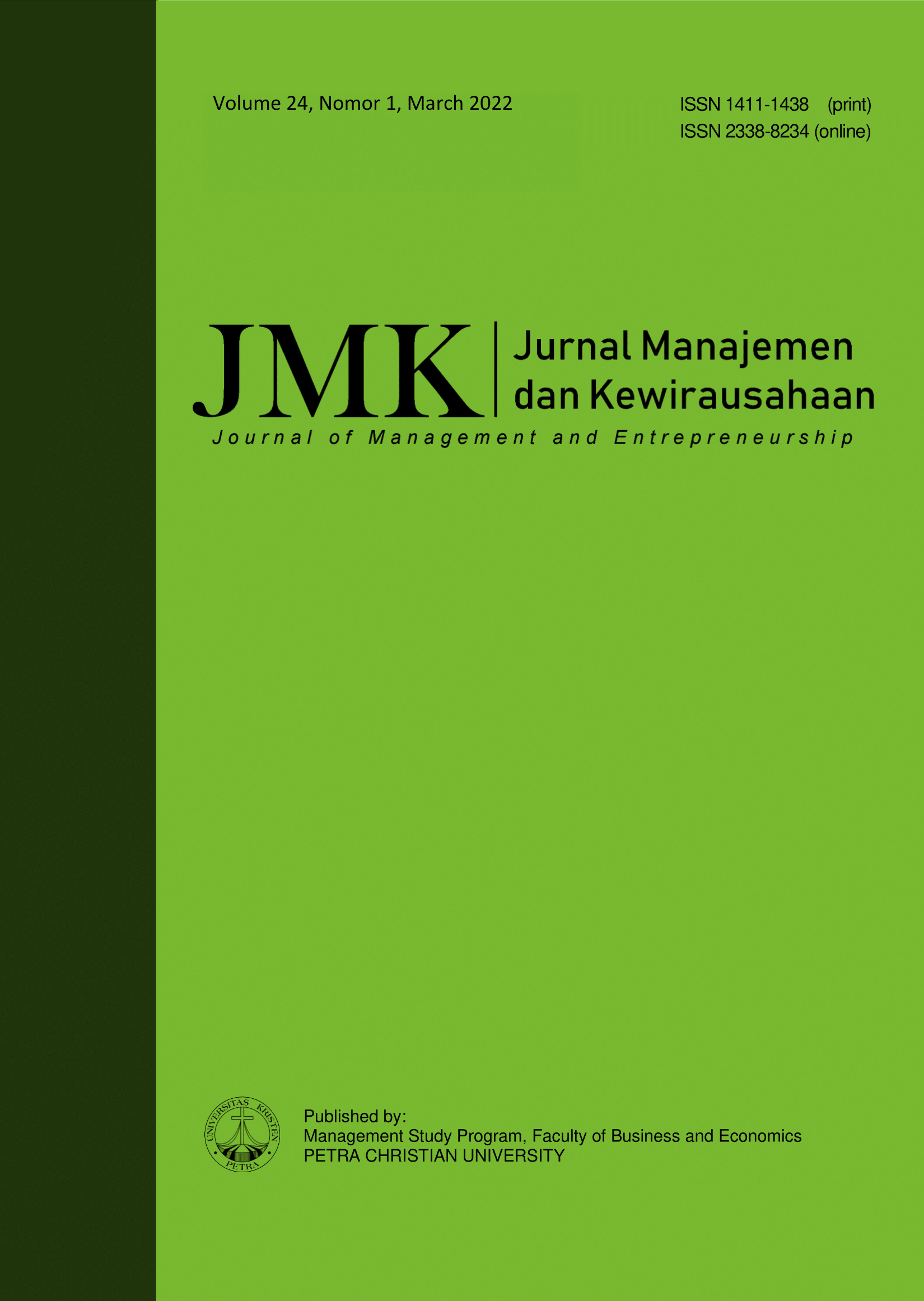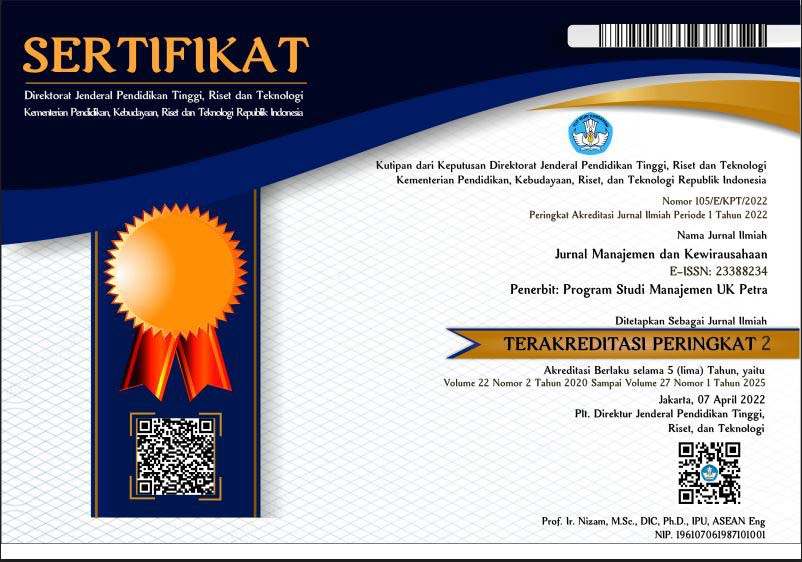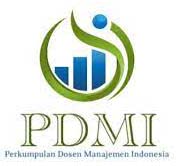JOB ACCOMPLISHMENT THROUGH INFORMATION TECHNOLOGY COMPETENCIES AND CORPORATE SOCIAL MEDIA USAGE OF COMPANY EMPLOYEES IN INDONESIA
 :
:
https://doi.org/10.9744/jmk.24.2.159-169
Keywords:
Job accomplishments, corporate social media, information technology competencies distribution, job interconnection distributionAbstract
This research aimed to examine the factors that could affect the distribution of jobs accomplishment, which was included the distribution of corporate social media, information technologies competencies, and jobs interconnections. This research used the partial least square-structural equation model (PLS-SEM) to test the proposed hypothesis. Participants in this study included 367 respondents as the employees in Indonesia. The data collected in this research used a surveyed approached to get responses from participants. The results of data analysis in this research revealed that corporate social media had a significant direct effect on jobs accomplishment and jobs interconnections. In addition, the information technologies competencies had also showed to have an essential direct role in jobs accomplishment and jobs interconnections. Jobs interconnections had also showed to have a significant direct influence on jobs accomplishment. This study proved that jobs interconnections had a significant mediating effect on the relationship between corporate social media and jobs accomplishment, but it had no influencers the relationship between information technologies competencies and jobs accomplishment.
References
Ali, A., Bahadur, W., Wang, N., Luqman, A., & Khan, A. N. (2020). Improving team innovation performance: Role of social media and team knowledge management capabilities. Technology in Society, 61, 101259. https://doi.org/10.1016/j.techsoc.2020.101259
Bassellier, G., Benbasat, I., & Reich, B. H. (2003). The influence of business managers’ IT competence on championing IT. Information Systems Research, 14(4), 317–336. https://doi.org/10.1287/isre.14.4.317.24899
Cai, Z., Huang, Q., Liu, H., & Wang, X. (2018). Improving the agility of employees through enterprise social media: The mediating role of psychological conditions. International Journal of Information Management, 38(1), 52–63. https://doi.org/10.1016/j.ijinfomgt.2017.09.001
Campion, M. A., & Medsker, G. J. (1993). Relations between work group characteristics and effectiveness: Implications for designing effective work groups. Personnel Psychology, 46(4), 823–847. https://doi.org/10.1111/j.1744-6570.1993.t b01571.x
Duman, M. C., & Akdemir, B. (2021). A study to determine the effects of industry 4.0 technology components on organizational performance. Technological Forecasting and Social Change, 167, 120615. https://10.1016/j.techfore.2021.120615
Friedman, A., Carmeli, A., & Dutton, J. E. (2018). When does respectful engagement with one’s supervisor foster helpseeking behaviors and performance? Journal of Vocational Behavior, 104, 184–198. https://doi.org/10.1016/j.jvb.2017.11.007
Hair, J. F., Black, W. C., Babin, B. J., & Anderson, R. E. (2018). Multivariate data analysis (8th Edition). Cengage.
Hair, J. F., & Sarstedt, M. (2021). Explanation Plus prediction - The logical focus of project management research. Project Management Journal, 52 (4), 319–322. https://doi.org/10.1177/8756972821999945
Islam, T., Pitafi, A. H., Akhtar, N., & Xiaobei, L. (2021). Determinants of purchase luxury counterfeit products in social commerce: The mediating role of compulsive internet use. Journal of Retailing and Consumer Services, 62, 102596. https://doi.org/10.1016/j.jretconser.2021.102596
Janssen, O., & Yperen, N. W. Van. (2004). Employees’ goal orientations, the quality of leader-member exchange, and the outcomes of job perfor-mance and job satisfaction. Academy of Management Journal, 47(3), 368–384. https://doi.org/10.5771/0531-2485-2005-3-255
Latif, K., Weng, Q., Pitafi, A. H., Ali, A., Siddiqui, A. W., Malik, M. Y., & Latif, Z. (2021). Social comparison as a double-edged sword on social media: The role of envy type and online social identity. Telematics and Informatics, 56, 1014 70. https://doi.org/10.1016/j.tele.2020.101470
Li, Y., Dai, J., & Cui, L. (2020). The impact of digital technologies on economic and environmental performance in the context of industry 4.0: A moderated mediation model. International Journal of Production Economics, 229. https://doi.or/10.1016/j.ijpe.2020.107777
Li, Y., Shepherd, M., Liu, J. Y. C., & Klein, G. (2017). Enhancing development team flexibility in IS projects. Information Technology and Management, 18, 83–96. https://doi.org/10.1007/s10799 -016-0258-4
Mäntymäki, M., & Riemer, K. (2016). Enterprise social networking: A knowledge management perspective. International Journal of Information Management, 36(6), 1042–1052. https://doi.org/10.1016/j.iJInfomgt.2016.06.009
Ou, C. X. J., & Davison, R. M. (2011). Interactive or interruptive? Instant messaging at work. Decision Support Systems, 52(1), 61–72. https://doi.org/10.1016/j.dss.2011.05.004
Paik, J. H., Kim, M. K., & Park, J. H. (2017). The antecedents and consequences of technology standardizations in Korean IT small and mediumsized enterprises. Information Technology and Management, 18(4), 293–304. https://doi.org/10.1007/s10799-016-0268-2
Pavithra, S., & Deepak, K. V. (2021). The effect of social media on employees’ job performance with reference to information technology (IT) sector in Bangalore. Materials Today: Proceedings. https://doi.org/10.1016/j.matpr.2020.11.067
Peng, J., Quan, J., Zhang, G., & Dubinsky, A. J. (2015). Knowledge sharing, social relationships, and contextual performance: The moderating influence of information technology competence. Journal of Organizational and End User Computing, 27 (2), 58–73. https://doi.org/10.4018/joeuc.20150 40103
Pitafi, A. H., Kanwal, S., Ali, A., Khan, A. N., & Ameen, M. W. (2018). Moderating roles of IT competency and work cooperation on employee work performance in an ESM environment. Technology in Society, 55, 199–208. https://doi.org /10.1016/j.techsoc.2018.08.002
Pitafi, A. H., Khan, A. N., Khan, N. A., & Ren, M. (2020). Using enterprise social media to investigate the effect of workplace conflict on employee creativity. Telematics and Informatics, 55, 1014 51. https://doi.org/10.1016/j.tele.2020.101451
Pitafi, A. H., Rasheed, M. I., Kanwal, S., & Ren, M. (2020). Employee agility and enterprise social media: The Role of IT proficiency and work ex-pertise. Technology in Society, 63, 101333. https://doi. org/10.1016/j.techsoc.2020.101333
Rakshit, S., Mondal, S., Islam, N., Jasimuddin, S., & Zhang, Z. (2021). Social media and the new product development during COVID-19: An integrated model for SMEs. Technological Forecasting and Social Change, 170, 120869. https://doi .org/10.1016/j.techfore.2021.120869
Rasheed, M. I., Malik, J., Pitafi, A. H., Iqbal, J., Anser, M. K., & Abbas, M. (2020). Usage of social media, student engagement, and creativity: The role of knowledge sharing behavior and cyberbullying. Computers and Education, 159, 104002. https://doi.org/10.1016/j.compedu.2020.104002
Rasool, A., Shah, F. A., & Islam, J. U. (2020). Customer engagement in the digital age: A review and research agenda. Current Opinion in Psychology, 36, 96–100. https://doi.org/10.1016/j.copsyc.2020.05.003
Razmerita, L., Kirchner, K., & Nielsen, P. (2016). What factors influence knowledge sharing in organizations? A social dilemma perspective of social media communication. Journal of Knowledge Management, 20(6), 1225–1246. https://doi.org/10.1108/JKM-03-2016-0112
Sharma, R., & Yetton, P. (2003). The contingent effects of management support and task interdependence on successful information systems implementation. MIS Quarterly: Management Information Systems, 27(4), 533–555. https://doi.org/10.2307/30036548
Shiau, W.-L., Sarstedt, M., & Hair, J. F. (2019). Internet research using partial least squares structural equation modeling (PLS-SEM). Internet Research, 29(3), 398–406. https://doi.org/10.1108/ IntR-10-2018-0447
Viete, S., & Erdsiek, D. (2020). Mobile information technologies and firm performance: The role of employee autonomy. Information Economics and Policy, 51, 100863. https://doi.org/10.1016/j.infoeco pol.2020.100863
Welbourne, J. L., & Sariol, A. M. (2017). When does incivility lead to counterproductive work behavior? Roles of job involvement, task interdependence, and gender. Journal of Occupational Health Psychology, 22(2), 194–206. https://doi.org/10.1037/ocp0000029
Wu, C., Zhang, Y., Huang, S., & Yuan, Q. (2021). Does enterprise social media usage make the employee more productive? A meta-analysis. Telematics and Informatics, 60, 101578. https://doi.org/10.1016/j.tele.2021.101578
Downloads
Published
How to Cite
Issue
Section
License
Authors who publish on this journal agree to the following terms:
- Authors retain copyright and grant the journal right of first publication with the work simultaneously licensed under a Creative Commons Attribution License that allows others to share the work with an acknowledgement of the work's authorship and initial publication in this journal.
- Authors are able to enter into separate, additional contractual arrangements for the non-exclusive distribution of the journal's published version of the work (e.g., post it to an institutional repository or publish it in a book), with an acknowledgement of its initial publication in this journal.
- Authors are permitted and encouraged to post their work online (e.g., in institutional repositories or on their website) prior to and during the submission process, as it can lead to productive exchanges, as well as earlier and greater citation of published work (See The Effect of Open Access).


















